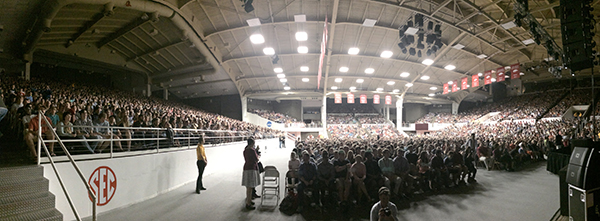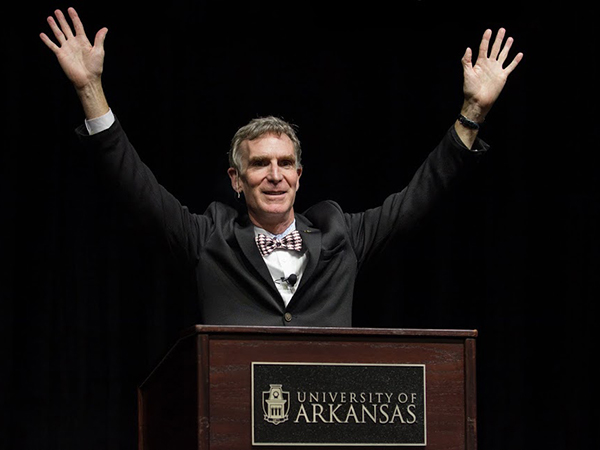FAYETTEVILLE, Ark. – Bill Nye, the Science Guy, entertained a record crowd of students, faculty and parents who filled Barnhill Arena to capacity Friday evening, telling the crowd that the “joy of discovery” is the essence of science. “It’s why you’re at the University of Arkansas,” he said to loud applause.
More than 7,500 people gathered at Barnhill to hear Nye, filling seats into the rafters the way they did when the Arkansas basketball team was competing for its first NCAA Final Four appearance back in the late 1970s.
Instead of watching the athletic prowess of Marvin Delph, Sidney Moncrief and Ron Brewer, though, these fans of science and critical thinking were here to watch a man whom at first glance might be mistaken for a high school physics teacher.
In the one-room schoolhouse of public television, Nye played exactly that part, becoming famous as the über-science teacher, “Bill Nye, the Science Guy,” first on Seattle television and then transforming that character into a PBS series that won 19 Emmy Awards. A scientist, educator, engineer, comedian, author and inventor, Nye began explaining the fundamentals of science to a generation of youngsters during the 1990s, and they are now in college, many of them as excited about science as Nye is.
“I got here at 3:30 because I’ve watched Bill Nye all my life,” said Sam McLemore, a sophomore electrical engineering major from Atlanta. “When I saw he was coming to the University of Arkansas, I wanted to be on the front row. I figure he’s going to blow our minds for the next few hours.”
“I watched Bill Nye since I was a kid,” said Megan Clark, a graduate student in the university's creative writing program. She also watched Nye recently in a televised debate with a proponent of creation science. “We all watched the debate he had with the creationist guy. I’m really interested in the political aspects of what he has to say.”
Sitting alongside Clark was Alice Otto, another student in the creative writing program. Otto, who recently received an Individual Artist Fellowship from the Arkansas Arts Council, said, “I hope he confuses us, and then enlightens us.”
Those seem sentiments worthy of any short story writer, and they are Nye’s stock in trade.
 A record crowd for distinguished lectures awaits Bill Nye at Barnhill Arena. A record crowd for distinguished lectures awaits Bill Nye at Barnhill Arena. |
Nye began his lecture by telling the crowd about his father’s love of sundials. He wrote the authoritative – and perhaps only – book on sundials and created “sand-dials,” sun dials that could be erected at the beach. Get it, sun dial/sand-dial? As a young son, he was unimpressed too. But Nye brought the audience back to the intrinsic beauty and science of sundials by explaining how the ancients used twigs stuck in the ground to understand not only the change in the time of day but also the shift of the sun through the seasons of the year.
“People who developed calendars and our reckoning of time did it by observing the shadows of sticks,” he said, “and they made insights that utterly changed the world.”
Their insights led to the development of the calendar, a document that everyone trusts implicitly to be correct but with little recognition of why calendar is correct.
“You’re not the least bit concerned with what’s in the calendar,” Nye said. “This thing that we all take for granted is a result of the process of science, the result of our diligent ancestors watching shadows ever so carefully to understand what I like to call our place in space.”
They recognized that an extra day should be added every four years to keep the calendar even with the actual length of a year and that because even this was slightly off, not having a leap year every 100 years would be even more exact.
He then turned his discussion to objects like asteroids and large meteors that have come near hitting Earth and the damage they would do.
“If one of these things hits here, that’s it. We’re done with Arkansas, we’re done with Texas and Oklahoma,” Nye said, putting forward a scientific challenge to the Arkansas audience. “So I want you guys to deflect an asteroid. You are the first generation of people who can do something about this. And this is the only preventable natural disaster. You can’t prevent an earthquake. You can’t prevent a hurricane. But we could prevent an asteroid from hitting the Earth.”
To prevent an asteroid from hitting earth, it doesn’t take a sledgehammer like a nuclear weapon. Instead it takes a small nudge or tug far out on the path of the object to shift its trajectory ever so slightly away from Earth. Finding that solution takes the same diligent observation and scientific thoughtfulness as understanding time by way of a sundial.
During a question and answer period, McLemore, the sophomore who waited in line for nearly four hours, asked how we shift from fossil-based energy to renewable energy, and another student asked how any country can make a difference if other countries refuse to participate. It was a question that members of the media asked Nye prior to the show as well.
“I want the United States to lead the world,” Nye said. “If we address climate change with policy, that’s one thing. But if we address it with innovation, that’s the way we change the world.”
Contacts
Charlie Alison, executive editor
University Relations
479-575-6731,
